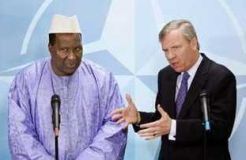NATO says alarmed by rising Darfur violence
Nov 9, 2005 (BRUSSELS) — NATO joined a growing chorus of alarm over rising violence in Sudan’s Darfur region on Wednesday but insisted it did not have a mandate for military intervention to help over-stretched African Union (AU) troops.
 In its first mission on the African continent, the Western military alliance has flown 5,000 AU soldiers into the region since July and helped train officers, but has held back from proposing a direct role for itself.
In its first mission on the African continent, the Western military alliance has flown 5,000 AU soldiers into the region since July and helped train officers, but has held back from proposing a direct role for itself.
“The African Union is not as well equipped as a Western army might be. But there is no political will for any intervention force,” said a NATO official who requested anonymity. He added that he meant the requisite will did not exist in either Sudan, Africa or the international community.
“NATO is doing what it has been asked to do — no more or less. There is no scope to do any more,” he said, referring to current agreements with Sudan and the AU on its role.
NATO envoys were told by General Andre Delawe, the Belgian officer liaising on the ground between NATO and the AU, that there had been a sharp deterioration in security, political and humanitarian conditions in the region in recent weeks.
“There has been an upsurge in activity by the Janjaweed, increasing difficulties in the political process, (and) the threat of serious food shortages. The overall assessment from people who have been there on the ground is quite negative,” the official added.
The “Janjaweed” militiamen stand accused of a devastating campaign of rapes, killings and burning during a two-year conflict that has claimed tens of thousands of lives and forced 2 million people from their homes.
NATO has encountered problems transporting troops, and notably in getting permission to send in some 105 Canadian armoured personnel carriers, the official said.
The International Committee of the Red Cross (ICRC) has said the escalating violence poses a threat to this month’s crucial harvest as well as to aid programmes.
Yet U.N. officials and others have complained the world’s attention has drifted away from Darfur at a critical moment.
John Bolton, U.S. envoy to the United Nations, said last week that AU efforts to secure peace in Darfur were insufficient and that more steps were needed, including possibly stronger sanctions on Khartoum.
There have also been calls for Western military intervention. U.S. General Wesley Clark, NATO Supreme Allied Commander Europe from 1997 to 2000, urged the United Nations in August to allow NATO to deploy “bridging forces” while the AU brought its troop levels up to strength.
(Reuters)
